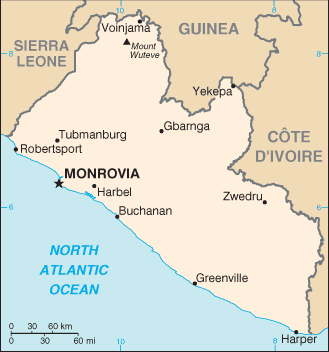Liberia
Map Courtesy CIA World Factbook
The history of Liberia as a political entity begins with the arrival of the black American settlers — the Americo-Liberians, as they were to be known — who established a colony of “free men of color” on its shore in 1822 under the auspices of the American Colonization Society. The historical roots from which a majority present-day Liberians derive their identity, however, are found in the varied traditions of the several tribal groups of indigenous Africans whom the settlers confronted in their struggle to gain a foothold in Africa and, later, extend their control into the interior. On July 26, 1847, the Americo-Liberians declared the independence of the Republic of Liberia. The settlers regarded the continent from which their forefathers had been taken as slaves as a “Promised Land,” but they did not intend to become reintegrated into an African society. They referred to themselves as “Americans” and recognized as such by tribal Africans and by British colonial authorities in neighboring Sierra Leone. The symbols of their state — its flag, motto, and seal — and the form of government that they chose reflected their American background and immigrant experience. The social customs and cultural standards of the Americo-Liberians had their archetypes in the antebellum American South. These ideals strongly colored the attitudes of the settlers toward the indigenous African people. The new nation, as they conceived of it, was coextensive with the settler community and with those Africans who were assimilated into it. A recurrent theme in the country’s subsequent history, therefore, was the usually successful attempt of the Americo-Liberian minority to dominate people whom they considered “uncivilized” and inferior. They named the land "Liberia," which in European langauges and Latin means "Land of the Free".
The founding of Liberia was privately sponsored by American religious and philanthropic groups, but the colony enjoyed the support and unofficial cooperation of the United States government. Liberia’s government, modeled after that of the United States, was democratic in structure, if not always in substance. After 1877 the True Whig Party monopolized political power in the country, and competition for office was usually contained within the party, whose nomination virtually ensured election. Two problems confronting successive administrations were pressure from neighboring colonial powers, Britain and France, and the threat of financial insolvency, both of which challenged the country’s sovereignty. Liberia retained its independence but lost its claim to extensive territories that were annexed by Britain and France. Economic development was retarded by the decline of markets for Liberian goods in the late nineteenth century and by indebtedness on a series of loans, payments on which drained the economy. In late 1989, a civil war began, and in September 1990 Doe was ousted and killed by the forces of faction leader Yormie Johnson and members of the Gio tribe. The war ended in 1996, and a prominent warlord, Charles Taylor, was elected as President in 1997. Taylor's brutal regime targeted several leading opposition and political activists. In 1998, the government sought to assassinate child rights activist Kimmie Weeks for a report he had published on its involvement in the training of child soldiers. Taylor's autocratic and dysfunctional government led to a new rebellion in 1999. More than 200,000 people are estimated to have been killed in the civil wars. The conflict intensified in mid-2003, when the fighting moved closer to Monrovia. As the power of the government shrank and with increasing international and American pressure for him to resign, President Charles Taylor accepted an asylum offer by Nigeria, but vowed: "God willing, I will be back."
|
|||||||||||||||||
 The Republic of Liberia is a country on the west coast of Africa, bordered by Sierra Leone, Guinea, and Côte d'Ivoire. It has recently been afflicted by two civil wars (1989–1996 and 1999–2003) that have displaced hundreds of thousands of its citizens and destroyed the Liberian economy.
The Republic of Liberia is a country on the west coast of Africa, bordered by Sierra Leone, Guinea, and Côte d'Ivoire. It has recently been afflicted by two civil wars (1989–1996 and 1999–2003) that have displaced hundreds of thousands of its citizens and destroyed the Liberian economy.